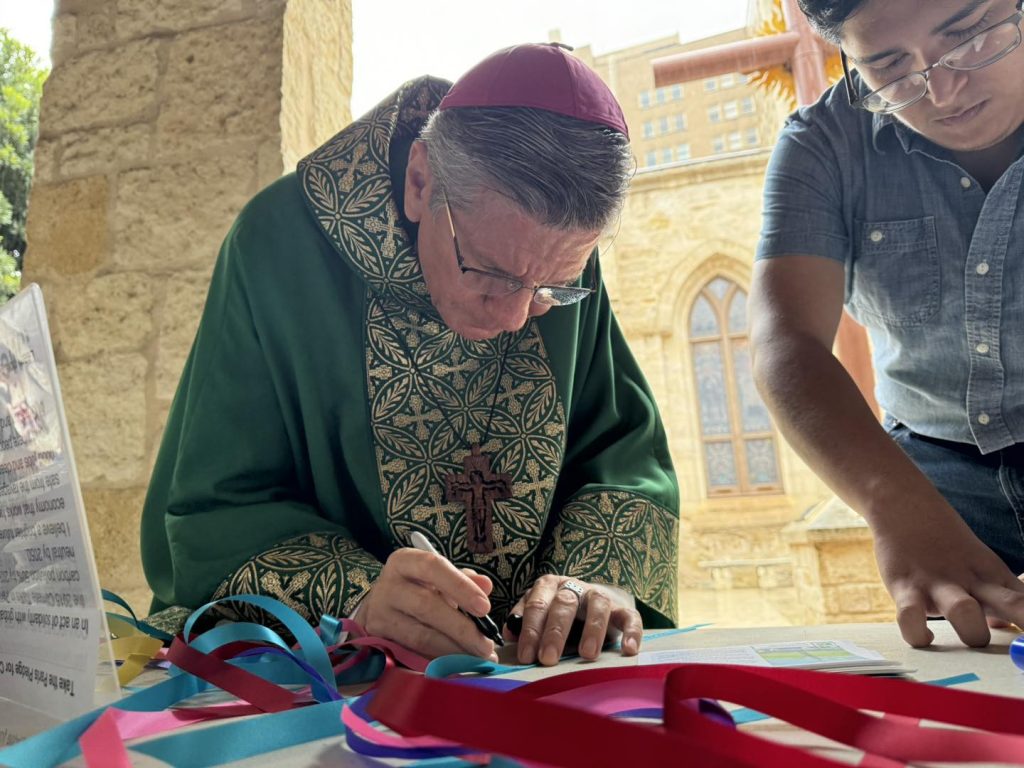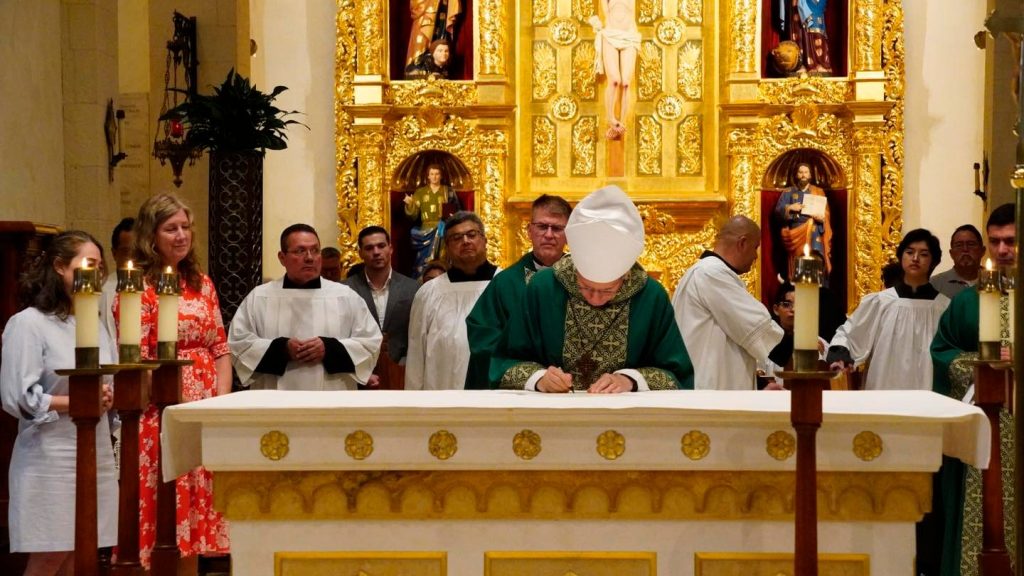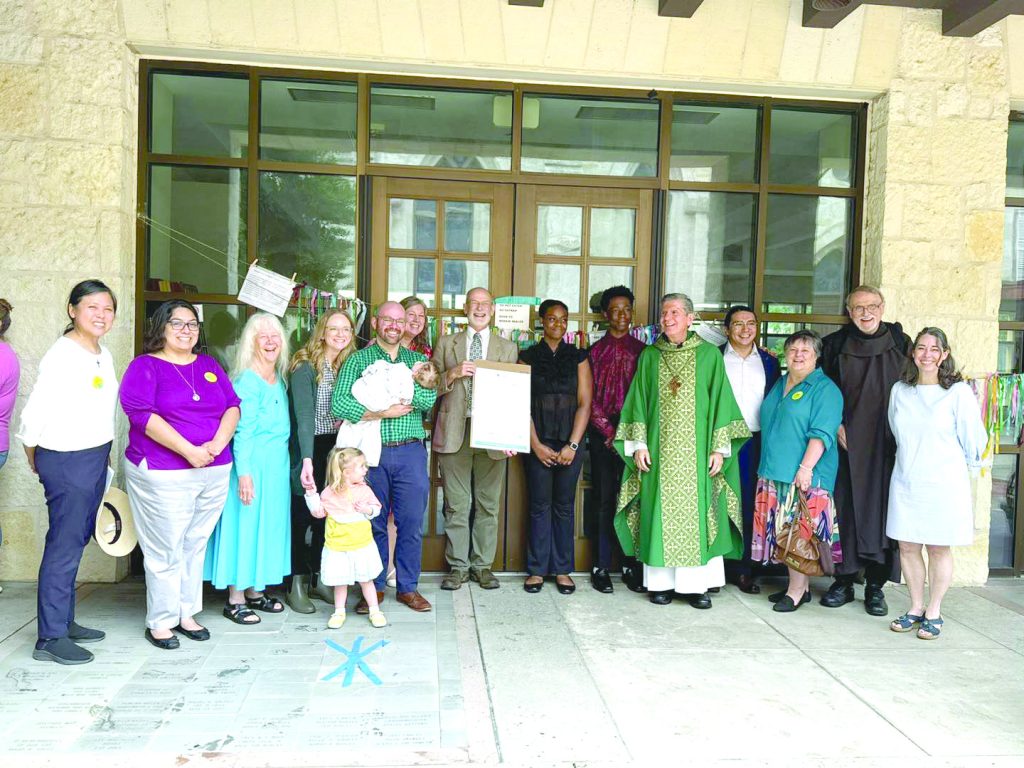
Pope Benedict XVI named Gustavo García-Siller as Archbishop of San Antonio on October 14, 2010. Installed as Archbishop on November 23, 2010 at St. Mark the Evangelist Church in San Antonio, Texas, he succeeded Archbishop Jose H. Gomez as the sixth Archbishop of San Antonio. On a national level, Archbishop García-Siller currently serves on a number of committees for the United States Conference of Catholic Bishops (USCCB)—the Cultural Diversity Committee on Hispanic Affairs, African American Affairs, Committee on Hispanics and the Liturgy, and the Committee on Migration (USCCB).
1. Could you elaborate on the moment or insight that led the Archdiocese of San Antonio to embrace the platform? How does this align with the broader mission of the Church in your community?
Archbishop Gustavo:
During this 150th anniversary year of the establishment of our Diocese, the platform represents an opportunity to reflect on our mission to evangelize and pray for renewed apostolic zeal. Our unity is not uniformity, but a beautiful diversity of charisms and gifts, each given for building up. Every believer is called to serve, to give, and to share the Good News.
We are called to leave behind everything that hinders our mission and to open our hearts to Christ’s transformative love; to be agents of mercy, welcoming the marginalized, the forgotten, the sinner. We ask God for guidance to help balance competing interests with temperance, ensuring that the dignity of every individual is upheld, especially the most vulnerable. And, that our actions encourage greater engagement on the part of all, through their irreplaceable individual contribution to the common good. In these moments of challenge and division, we seek to work collaboratively and with compassion in a spirit of service, integrity, and generosity. We pray that the Archdiocese of San Antonio continue to be a beacon of hope and faith for generations to come, and for a more just and prosperous community.

Archbishop Gustavo García-Siller, MSpS celebrates the Archdiocese’s commitment to the Laudato Si’ Action Platform on July 28 at San Fernando Cathedral during English and Spanish language Masses.
2. You have placed significant emphasis on synodality. Could you discuss how these values guide your diocesan efforts in environmental stewardship and social justice, shaping the initiatives under the platform?
Archbishop Gustavo:
During our synodal listening sessions we were reminded of the healing that we all need, not just individually but also as a human family, called to care for our common home, the Earth. We live on a planet that is wounded: our planet suffers from environmental degradation, and the poor and the vulnerable bear the heaviest burdens.
Yet, in the midst of this, we hear Jesus’ call to healing. He says to be open to healing, to renewal, to the transformation of the world and the way we live in it. We are called to recognize the deep interconnectedness between God, humanity, and creation. Caring for the Earth is not just an environmental issue; it is a moral and spiritual responsibility.
As we commit to Jesus’ mission of healing, gratitude and praise should flow from our hearts. Pope Francis has pointed out that the Blessed Virgin Mary is the Mother and Queen of all creation, and that hence, we can ask her to enable us to look at this world with eyes of wisdom. We are entrusting ourselves to the motherly care of Our Lady of Guadalupe as we seek to follow her Son in building a world of sustainability, solidarity, and stewardship.
3. Public commitments can profoundly influence community engagement. Why was it important to make this commitment public on integral ecology specifically, and what impacts do you foresee it having both within the community and across other Dioceses?
Archbishop Gustavo:
The goals of the Laudato Si’ Action Platform call us to a renewed commitment to care for our common home. Our planet is a gift from God, entrusted to us to steward with love and care. The call to protect our common home is not merely an environmental issue, but a spiritual and moral imperative. By adopting renewable energies, protecting biodiversity, and promoting sustainable agriculture, we participate in the divine act of creation, sustaining life as God intended. When we see the beauty of creation, we see a reflection of the Creator’s glory. Eco-justice reminds us that the well-being of the Earth is intimately connected to the well-being of humanity, especially the most vulnerable.
Promoting solidarity is an essential component of this call. Projects that support indigenous communities, refugees, and children at risk are ways we can reflect God’s love and justice. Our commitment to eco-justice is a commitment to seeing Christ in the face of the poor and the marginalized. Our economy must serve the common good, respecting the limits of nature. Sustainable production and consumption, ethical investments, and supporting circular economies are ways to honor the interconnectedness of all life. By prioritizing care of the Earth and dignity for workers, we create an economy that reflects God’s justice and mercy.

Members and leaders of the Archdiocese of San Antonio celebrate the renewed commitment to integral ecology.
4. How do the principles of Catholic Social Teaching inspire the actions your Diocese hopes to take under the Laudato Si’ Action Platform?
Archbishop Gustavo:
Living sustainably is an expression of our faith. Reducing waste, adopting sustainable dietary habits, and avoiding single-use items are practical steps that honor the Creator. These are actions rooted in the idea of sufficiency, reminding us that true contentment comes not from excessive consumption but from living in harmony with God’s creation.
Even small efforts, blessed by God, can have a profound impact. Education is a key to fostering ecological conversion. By integrating Laudato Si’ into what we teach our children and promoting ecological awareness, we help others discover God in all things. Ensuring equitable access to education and promoting human rights are crucial in building a more sustainable world. Through ecological education, we nurture future generations who will continue to care for our common home.
Ecological conversion helps us see the divine in the beauty of creation and the suffering of the afflicted. Promoting creation-based liturgical celebrations and ecological catechesis are ways to integrate our spiritual lives with our care for the earth. Building resilient communities requires synodal engagement and action. Advocacy, rootedness, and a sense of belonging are essential in fostering community resilience. Our collective actions, rooted in faith, bring about changes in our community.
5. You have a devotion to St. Teresa of Calcutta and St. Francis of Assisi. The intersection of environmental issues with the challenges faced by the poor and vulnerable is profound. Could you share insights on how your Diocese addresses these interconnected concerns?
Archbishop Gustavo:
Mother Teresa was a woman who embodied the very essence of the teachings of Jesus and the wisdom of the Gospel. Her life was a deep testimony of God’s will, as she dedicated herself entirely to serving the poorest of the poor. In a world that often glorifies material success and intellectual competence, Mother Teresa’s life challenges us to look beyond the superficial and to seek the deeper wisdom that comes from God.
We are constantly bombarded with messages that equate happiness with wealth, power, and privilege. Mother Teresa’s life teaches us that true happiness lies in living out the Gospel, in loving and serving others with the selfless love of God. Her wisdom was not of this world but of God, who called her to see Christ in the distressing disguise of the poor, the sick, and the dying.
Her unwavering faith in the face of trials is a powerful reminder for us. Mother Teresa trusted in the Lord’s command and ventured into the deep waters of human suffering. Her “catch” was not of material gain but compassionate service. We should be inspired by her example to seek the true wisdom that comes from God, to trust in His Word, and to dedicate our lives to the service of others.
6. What are your aspirations for the Archdiocese of San Antonio regarding its ecological and social commitments moving forward? How do you envision the Diocese evolving through its engagement with the Laudato Si’ Action Platform?
Archbishop Gustavo:
The ecosystem is a reflection of the divine life into which Jesus invites us. By responding to the cries of the earth and the poor, embracing sustainable lifestyles, promoting ecological education and spirituality, and building resilient communities, we participate in the divine work of creation.
We trust in God’s abundant provision that we may share generously and walk together on this journey of ecological conversion. True discipleship means we cannot remain within the confines of our comfort zones. We look at the examples of the first disciples, who left everything familiar to follow Jesus. They ventured into unknown territories, faced opposition, and embraced the cross. They did this because they understood that discipleship is relational – it is about forming connections and building communities.
As disciples, we are called to step out of our comfort zones and build relationships with those around us, especially with the vulnerable and forgotten – the poor, the marginalized, the outcasts. Our world is in desperate need of love. As God’s people, we are called to be that hope, to be the hands and feet of Christ in the world today. The Holy Spirit, who breathed life into the Church at Pentecost, continues to urge us forward, guiding us as we carry out this mission in our time.